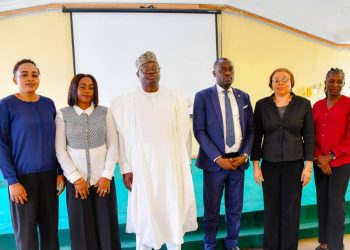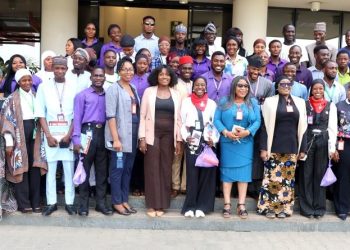…urges women experiencing abuse to break their silence and have faith in the legal system
By Nkechi Eze
The Abuja branch of the International Federation of Women Lawyers (FIDA) has made a passionate appeal for a robust collaboration with the media to promote and protect the rights of women and children in Nigeria.
During a media engagement in Abuja, Chioma Onyenucheya-Uko, Chairperson of the FIDA Abuja branch, underscored the importance of collaborating with the media. According to her, this partnership is crucial for showcasing FIDA’s efforts and identifying cases that require the organization’s intervention, thereby amplifying the voices of vulnerable women and children.
According to FIDA Abuja, the media plays a pivotal role in shaping public opinion and influencing policy decisions, making them a crucial ally in the quest for gender equality and justice.
FIDA has led efforts to combat gender-based violence and was instrumental in advocating for the passage of the Violence Against Persons Prohibition (VAPP) Act in 2015.
“Top on our list of things to do which is why we are having this parley this afternoon is that with the work we do, with the people we serve in our mandate as FIDA, it is impossible to effectively do that work if you do it alone, and it is impossible for us to effectively do that work if we have everybody sign on and we do not have the media with us, because part of the challenge we have is that there is poor enlightenment on the issues”
She emphasized the significance of this collaboration, noting that it raises awareness among the public and provides the necessary exposure to keep people well-informed.
“It is obvious that a lot of people don’t even understand the provisions of the law, particularly as it affects women and children, so sometimes infractions are because of ignorance which unfortunately the law doesn’t permit as an excuse. So as part of helping in enlightening people about legal provisions on subject of women and children, we need you”
According to the chairperson, the organization aims to collaborate with law students in tertiary institutions, familiarizing them with FIDA’s mission and nurturing future generations of advocates dedicated to protecting women’s and children’s rights.
FIDA will also provide training for its members to enhance their handling of abuse cases and forge stronger partnerships with security agencies, religious and community leaders, and other stakeholders. This comprehensive approach seeks to establish a robust support system to combat harmful traditional practices and provide assistance to survivors of violence.
“There has been a lot of activities over the years, FIDA Abuja branch is 35 next year. All these time, it’s been a lot of work, consistently and if all these work is done without the necessary visibility people may not even realize that we are working and people may not realize where they can go to when they are in need of service we render”
She urged women experiencing abuse to break their silence and have faith in the legal system, stressing that seeking justice is crucial rather than staying with their abusers. Furthermore, she appealed to the public to stand in solidarity with victims, stating, “Victims should not be judged or silenced. Instead, we must show empathy and support to combat the scourge of violence in our communities.”
According to Adaora Onyechere Sydney Jack, Executive Director of Gender Strategy Advancement International (GSAI), “To effectively address gender-based violence and promote women’s and children’s rights, media support is needed. “Our collaboration should be built on mutual respect, professionalism, and integrity. The media plays a significant role in shaping narratives, and we must work together to ensure our interactions promote positive change.
“Furthermore, we require effective communication to ensure that sensitive stories, particularly those involving domestic and sexual violence, are reported promptly and accurately.
Appealing to FIDA, she emphasized that “To enhance responsible reporting, training programs are essential to equip journalists with the necessary expertise and sensitivity to cover gender-based issues. This includes avoiding stigmatizing language that can re-traumatize victims. By providing such training, we can significantly improve the way stories on gender-based violence are reported and framed.”















